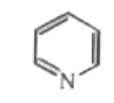Choose the most appropriate answer from the following options :
Among the following compounds identify the compound that has all three bonds (ionic, covalent and coordinate bond).
Ammonia
Ammonium chloride
Sodium hydroxide
Calcium chloride.
To solve the question of identifying which compound has all three types of bonds (ionic, covalent, and coordinate), we will analyze each of the provided options step by step.
Step 1: Understand the Types of Bonds
1. Ionic Bond: Formed by the transfer of electrons between atoms, resulting in the formation of oppositely charged ions.
2. Covalent Bond: Formed by the sharing of electrons between two atoms.
3. Coordinate Bond: A type of covalent bond where one atom donates both electrons to the bond.
Step 2: Analyze Each Compound
1. Ammonia (NH3):
- Contains only covalent bonds (between nitrogen and hydrogen).
- Conclusion: Does not have ionic or coordinate bonds.
2. Ammonium Chloride (NH4Cl):
- Dissociates into NH4⁺ (ammonium ion) and Cl⁻ (chloride ion).
- Ionic Bond: Between NH4⁺ and Cl⁻.
- Covalent Bonds: Between nitrogen and the three hydrogen atoms (N-H bonds).
- Coordinate Bond: The bond between nitrogen and one of the hydrogen atoms can be considered a coordinate bond, as nitrogen donates its lone pair to form the bond with H⁺.
- Conclusion: Contains ionic, covalent, and coordinate bonds.
3. Sodium Hydroxide (NaOH):
- Dissociates into Na⁺ and OH⁻.
- Ionic Bond: Between Na⁺ and OH⁻.
- Conclusion: Contains only ionic bonds and no covalent or coordinate bonds.
4. Calcium Chloride (CaCl2):
- Dissociates into Ca²⁺ and Cl⁻ ions.
- Ionic Bond: Between Ca²⁺ and Cl⁻.
- Conclusion: Contains only ionic bonds and no covalent or coordinate bonds.
Step 3: Identify the Compound with All Three Bonds
- From the analysis, the only compound that contains all three types of bonds (ionic, covalent, and coordinate) is Ammonium Chloride (NH4Cl).
Final Answer
The compound that has all three bonds (ionic, covalent, and coordinate) is Ammonium Chloride (NH4Cl).
---
1. Ionic Bond: Formed by the transfer of electrons between atoms, resulting in the formation of oppositely charged ions.
2. Covalent Bond: Formed by the sharing of electrons between two atoms.
3. Coordinate Bond: A type of covalent bond where one atom donates both electrons to the bond.
1. Ammonia (NH3):
- Contains only covalent bonds (between nitrogen and hydrogen).
- Conclusion: Does not have ionic or coordinate bonds.
- Dissociates into NH4⁺ (ammonium ion) and Cl⁻ (chloride ion).
- Ionic Bond: Between NH4⁺ and Cl⁻.
- Covalent Bonds: Between nitrogen and the three hydrogen atoms (N-H bonds).
- Coordinate Bond: The bond between nitrogen and one of the hydrogen atoms can be considered a coordinate bond, as nitrogen donates its lone pair to form the bond with H⁺.
- Conclusion: Contains ionic, covalent, and coordinate bonds.
- Dissociates into Na⁺ and OH⁻.
- Ionic Bond: Between Na⁺ and OH⁻.
- Conclusion: Contains only ionic bonds and no covalent or coordinate bonds.
- Dissociates into Ca²⁺ and Cl⁻ ions.
- Ionic Bond: Between Ca²⁺ and Cl⁻.
- Conclusion: Contains only ionic bonds and no covalent or coordinate bonds.
- From the analysis, the only compound that contains all three types of bonds (ionic, covalent, and coordinate) is Ammonium Chloride (NH4Cl).
The compound that has all three bonds (ionic, covalent, and coordinate) is Ammonium Chloride (NH4Cl).
Topper's Solved these Questions
- CHEMICAL BONDING BOOK - ICSECHAPTER - CHEMICAL BONDING EXERCISE - Questions from Previous ICSE Board Papers (2014)
12 Videos
- CHEMICAL BONDING BOOK - ICSECHAPTER - CHEMICAL BONDING EXERCISE - Questions from Previous ICSE Board Papers (2015)
6 Videos
- CHEMICAL BONDING BOOK - ICSECHAPTER - CHEMICAL BONDING EXERCISE - Questions from Previous ICSE Board Papers (2012)
1 Videos
- ANALYTICAL CHEMISTRY-USE OF AMMONIUM & SODIUM HYDROXIDEBOOK - ICSECHAPTER - ANALYTICAL CHEMISTRY-USE OF AMMONIUM & SODIUM HYDROXIDEEXERCISE - Additional Questions
6 Videos
- CHEMISTRY 2011BOOK - ICSECHAPTER - CHEMISTRY 2011EXERCISE - SECTION-II
48 Videos
Similar Questions
Knowledge Check
Among the following compounds, the most basic compound is :
A B
B C
C D
D
Choose the most appropriate answer from the following options :
Among the period 2 elements, the element which has high electron affinity is :ALithiumBCarbonCChlorineDFluorine
Choose the most appropriate answer from the following options :
Which of the following is not a typical property of an ionic compound?
View SolutionChoose the most appropriate answer from the following options :
Nitrogen gas can be obtained by heating :
View SolutionChoose the most appropriate answer from the following options :
Which one of the following will not produce an acid when made to react with water?
View SolutionChoose the most appropriate answer from the following options :
Identify the statement that is incorrect about alkanes
View SolutionChoose the most appropriate answer from the following options :
Among the period 2 elements, the element which has high electron affinity is :
View SolutionChoose the most reactive among the following compound :
View Solution
